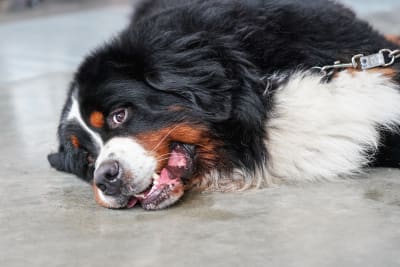What is COPD?
In people, COPD (Chronic obstructive pulmonary disease), is a progressive disease of the lungs that restricts airflow into and out of your lungs.
When found in dogs, COPD is an irreversible and progressive inflammatory condition that significantly impacts your companion's respiratory system. This can make it quite difficult for your pup to breathe. In our four-legged friends, COPD may also be diagnosed as chronic bronchitis.
What causes COPD in dogs?
Though COPD is most often diagnosed in older dogs, more research is needed to identify the specific cause of COPD in dogs. However, exposure to inhaled irritants such as air pollution or tobacco smoke may cause inflammation of the respiratory system. Recurrent respiratory infections may also be a culprit.
Since bacteria can travel from the mouth into other organs in your dog's body like their lungs, dogs experiencing dental disease are at higher risk of developing inflammation in their lungs. Once the bacteria causing this inflammation enters your dog's lungs, they may become infected in addition to their mouth which leads to respiratory inflammation.
Dogs who are obese may suffer more severe symptoms of COPD.
What are the signs of COPD in dogs?
Persistent and chronic dry coughing lasting for more than a month is an early symptom of COPD in dogs. In some instances, dogs with COPD may begin to gag after coughing.
When progressed to later stages, symptoms of this disease can also include:
- Wheezing
- Fainting with exertion
- Bluish tinge to gums
- Loud or noisy breathing
- Exercise intolerance (tiring easily)
How will my vet diagnose my dog with COPD?
Your vet will begin with a thorough physical exam to look for clinical signs of COPD in your dog, and a range of diagnostic tests can also be used. Signs that point to COPD include crackling sounds in your dog’s chest as he or she inhales or exhales, sinus arrhythmia, a normal or low heart rate, and chronic cough.
What are treatment options for COPD in dogs?
Your dog may require hospitalization if they are experiencing severe breathing problems. While they are in the hospital, a combination of intravenous medications and oxygen therapies may be used to stabilize your pup's condition.
Medications
If your dog’s case is less severe, he may be treated on an outpatient basis with a combination of treatments and medications such as mucolytics, cough suppressants, corticosteroids, bronchodilators, and antibiotics.
Other Treatments
- In some cases, antioxidants, supplements, and other supportive therapies may be recommended.
- Avoid exposing your dog to irritates as much as possible, such as cigarette smoke.
- Your veterinarian may recommend a change in diet or adding gentle exercise to help him lose extra weight.
- Switching from a collar to a harness may help to avoid applying extra pressure to your dog’s airway.
- You can eliminate harmful bacteria from your dog's mouth with professional teeth cleanings.
How long can a dog live with COPD?
Although in dogs, COPD is progressive and irreversible, routinely scheduled veterinary exams and proper treatments can help your vet and you manage your pup's symptoms, allowing your companion to enjoy a normal life expectancy and better quality of life.
Note: The advice provided in this post is intended for informational purposes and does not constitute medical advice regarding pets. For an accurate diagnosis of your pet's condition, please make an appointment with your vet.
Is your dog having breathing issues, or have you noticed any symptoms of bronchitis? Contact our South Wilton veterinary team as soon as possible to book an appointment.
 Looking for a vet in South Wilton?
Looking for a vet in South Wilton?
We're always accepting new patients, so contact our veterinary hospital today to book your pet's first appointment.
Related Articles View All
C-Section for Dogs: Everything You Should Know
Our South Wilton vets share some information about c-sections in dogs, when they might be needed, and what you can expect.
Enucleation: Eye Removal in Cats & Dogs
Learning that your cat or dog needs eye removal surgery can be upsetting, and you'll probably have many questions. Our veterinarians in South Wilton explain pet eye removal, recovery times, potential complications, and more.
Why does my pet need a urinalysis?
Your vet can perform a urinalysis to determine whether your cat or dog may have a health condition or disease that needs treatment. Here, our South Wilton veterinarians explain why regular urinalysis testing for pets is a critical part of their care.
Understanding Blood Tests for Dogs
Dogs and cats often require diagnostic blood tests to reveal vital health information about underlying health conditions. In this post, our veterinarians at South Wilton explain the significance of these tests for pets.


